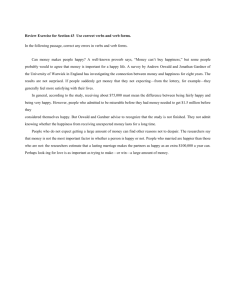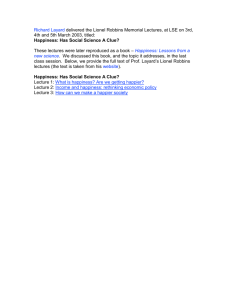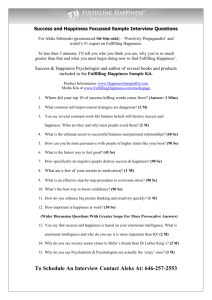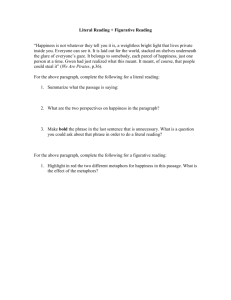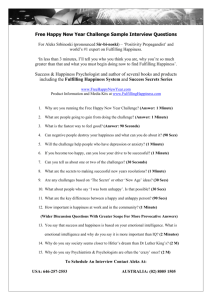poster - Harvard University
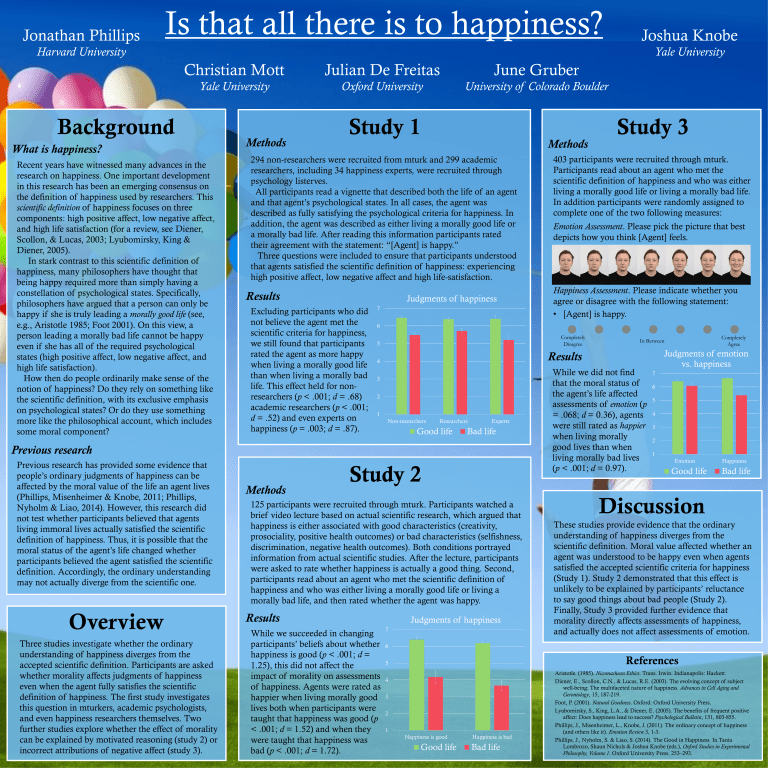
Jonathan Phillips
Harvard University
Is that all there is to happiness?
Christian Mott
Yale University
Julian De Freitas
Oxford University
June Gruber
University of Colorado Boulder
Background
What is happiness?
Recent years have witnessed many advances in the research on happiness. One important development in this research has been an emerging consensus on the definition of happiness used by researchers. This scientific definition of happiness focuses on three components: high positive affect, low negative affect, and high life satisfaction (for a review, see Diener,
Scollon, & Lucas, 2003; Lyubomirsky, King &
Diener, 2005).
In stark contrast to this scientific definition of happiness, many philosophers have thought that being happy required more than simply having a constellation of psychological states. Specifically, philosophers have argued that a person can only be happy if she is truly leading a morally good life (see, e.g., Aristotle 1985; Foot 2001). On this view, a person leading a morally bad life cannot be happy even if she has all of the required psychological states (high positive affect, low negative affect, and high life satisfaction).
How then do people ordinarily make sense of the notion of happiness? Do they rely on something like the scientific definition, with its exclusive emphasis on psychological states? Or do they use something more like the philosophical account, which includes some moral component?
Previous research
Previous research has provided some evidence that people’s ordinary judgments of happiness can be affected by the moral value of the life an agent lives
(Phillips, Misenheimer & Knobe, 2011; Phillips,
Nyholm & Liao, 2014). However, this research did not test whether participants believed that agents living immoral lives actually satisfied the scientific definition of happiness. Thus, it is possible that the moral status of the agent’s life changed whether participants believed the agent satisfied the scientific definition. Accordingly, the ordinary understanding may not actually diverge from the scientific one.
Overview
Three studies investigate whether the ordinary understanding of happiness diverges from the accepted scientific definition. Participants are asked whether morality affects judgments of happiness even when the agent fully satisfies the scientific definition of happiness. The first study investigates this question in mturkers, academic psychologists, and even happiness researchers themselves. Two further studies explore whether the effect of morality can be explained by motivated reasoning (study 2) or incorrect attributions of negative affect (study 3).
Joshua Knobe
Yale University
Study 1
Methods
294 non-researchers were recruited from mturk and 299 academic researchers, including 34 happiness experts, were recruited through psychology listerves.
All participants read a vignette that described both the life of an agent and that agent’s psychological states. In all cases, the agent was described as fully satisfying the psychological criteria for happiness. In addition, the agent was described as either living a morally good life or a morally bad life. After reading this information participants rated their agreement with the statement: “[Agent] is happy.”
Three questions were included to ensure that participants understood that agents satisfied the scientific definition of happiness: experiencing high positive affect, low negative affect and high life-satisfaction.
Results
Excluding participants who did not believe the agent met the scientific criteria for happiness, we still found that participants rated the agent as more happy when living a morally good life than when living a morally bad life. This effect held for nonresearchers ( p < .001; d = .68) academic researchers ( p < .001; d = .52) and even experts on happiness ( p = .003; d = .87).
7
6
5
4
3
2
1
Judgments of happiness
Non-researchers Researchers Experts
Good life Bad life
Study 2
Methods
125 participants were recruited through mturk. Participants watched a brief video lecture based on actual scientific research, which argued that happiness is either associated with good characteristics (creativity, prosociality, positive health outcomes) or bad characteristics (selfishness, discrimination, negative health outcomes). Both conditions portrayed information from actual scientific studies. After the lecture, participants were asked to rate whether happiness is actually a good thing. Second, participants read about an agent who met the scientific definition of happiness and who was either living a morally good life or living a morally bad life, and then rated whether the agent was happy.
Results
While we succeeded in changing participants’ beliefs about whether happiness is good ( p < .001; d =
1.25), this did not affect the impact of morality on assessments of happiness. Agents were rated as happier when living morally good lives both when participants were taught that happiness was good ( p
< .001; d = 1.52) and when they were taught that happiness was bad ( p < .001; d = 1.72).
7
6
5
4
3
2
1
Judgments of happiness
Happiness is good Happiness is bad
Good life Bad life
Study 3
Methods
403 participants were recruited through mturk.
Participants read about an agent who met the scientific definition of happiness and who was either living a morally good life or living a morally bad life.
In addition participants were randomly assigned to complete one of the two following measures:
Emotion Assessment . Please pick the picture that best depicts how you think [Agent] feels.
Happiness Assessment . Please indicate whether you agree or disagree with the following statement:
•
[Agent] is happy.
Completely
Disagree
Results
While we did not find that the moral status of the agent’s life affected assessments of emotion ( p
= .068; d = 0.36), agents were still rated as happier when living morally good lives than when living morally bad lives
( p < .001; d = 0.97).
In Between
Completely
Agree
Judgments of emotion vs. happiness
7
6
5
4
3
2
1
Emotion
Good life
Happiness
Bad life
Discussion
These studies provide evidence that the ordinary understanding of happiness diverges from the scientific definition. Moral value affected whether an agent was understood to be happy even when agents satisfied the accepted scientific criteria for happiness
(Study 1). Study 2 demonstrated that this effect is unlikely to be explained by participants’ reluctance to say good things about bad people (Study 2).
Finally, Study 3 provided further evidence that morality directly affects assessments of happiness, and actually does not affect assessments of emotion.
References
Aristotle. (1985).
Nicomachean Ethics
. Trans. Irwin. Indianapolis: Hackett.
Diener, E., Scollon, C.N., & Lucas, R.E. (2003). The evolving concept of subject well-being: The multifaceted nature of happiness.
Advances in Cell Aging and
Gerontology
, 15, 187-219.
Foot, P. (2001).
Natural Goodness
. Oxford: Oxford University Press.
Lyubomirsky, S., King, L.A., & Diener, E. (2005). The benefits of frequent positive affect: Does happiness lead to success?
Psychological Bulletin
, 131, 803-855.
Phillips, J., Misenheimer, L., Knobe, J. (2011). The ordinary concept of happiness
(and others like it).
Emotion Review
3, 1-3.
Phillips, J., Nyholm, S. & Liao, S. (2014). The Good in Happiness. In Tania
Lombrozo, Shaun Nichols & Joshua Knobe (eds.),
Oxford Studies in Experimental
Philosophy, Volume 1
. Oxford University Press. 253–293.


